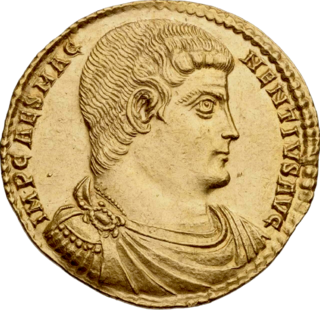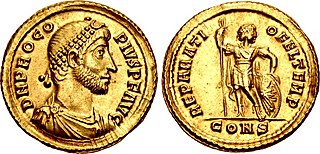Valens was a Roman emperor (364–378).
Valens may also refer to:

Year 366 (CCCLXVI) was a common year starting on Sunday of the Julian calendar. At the time, it was known as the Year of the Consulship of Gratianus and Dagalaifus. The denomination 366 for this year has been used since the early medieval period, when the Anno Domini calendar era became the prevalent method in Europe for naming years.
The 360s decade ran from January 1, 360, to December 31, 369.
The 370s decade ran from January 1, 370, to December 31, 379.

Year 261 (CCLXI) was a common year starting on Tuesday of the Julian calendar. At the time, it was known as the Year of the Consulship of Gallienus and Taurus. The denomination 261 for this year has been used since the early medieval period, when the Anno Domini calendar era became the prevalent method in Europe for naming years.

Magnus Magnentius was a Roman general and usurper against Constantius II. Of Germanic descent, Magnentius served with distinction in Gaul under the emperor Constans. On 18 January 350 Magnentius was acclaimed Augustus. Quickly killing the unpopular Constans, Magnentius gained control over most of the Western Empire. The Eastern emperor Constantius II, the brother of Constans, refused to acknowledge Magnentius' legitimacy and led a successful campaign against Magnentius. Ultimately, Magnentius' forces were scattered after the Battle of Mons Seleucus, and he died by suicide on 10 August 353.
Valentinus is a Roman masculine given name derived from the Latin word "valens" meaning "healthy, strong". It may refer to:

Procopius was a Roman usurper against Valens.
Gratian can refer to:

Valens Thessalonicus was a Roman usurper during the reign of Emperor Gallienus.
The Gallienus usurpers were the usurpers who claimed imperial power during the reign of Gallienus. The existence of usurpers during the Crisis of the Third Century was very common, and the high number of usurpers fought by Gallienus is due to his long rule; fifteen years being considered long by the standards of the 3rd century Roman Empire.

Lucius Calpurnius Piso Frugi was probably a Roman general whom the imperial pretender Macrianus Major sent to suppress the governor of Achaia, Valens Thessalonicus. His existence is attested only by the unreliable Historia Augusta, which labels Piso as one of several usurpers who plagued the reign of Emperor Gallienus. While some historians grudgingly regard Piso as a historical figure, many reported details of his life, including his usurpation, are dismissed as fabrications.
The Battle of Thyatira was fought in 366 at Thyatira, Lydia, between the army of the Roman Emperor Valens and the army of the usurper Procopius, led by his general Gomoarius.
The Battle of Mursa was fought on 28 September 351 between the eastern Roman armies led by the Emperor Constantius II and the western forces supporting the usurper Magnentius. It took place at Mursa, near the Via Militaris in the province of Pannonia. The battle, one of the bloodiest in Roman history, was a pyrrhic victory for Constantius.
Battle of Mursa can refer to either of two Roman battles at Mursa:
Procopius or Prokopios is a given name which may refer to:
Marcellus was an officer of the Roman Empire, supporter of usurper Procopius and briefly an usurper himself.

Byzantine Empire under the Constantinian and Valentinianic dynasties was the earliest period of the Byzantine history that saw a shift in government from Rome in the West to Constantinople in the East within the Roman Empire under emperor Constantine the Great and his successors. Constantinople, formally named Nova Roma, was founded in the city of Byzantium, which is the origin of the historiographical name for the Eastern Empire, which self-identified simply as the "Roman Empire".
Victor was a Roman military officer and politician, who served the emperors Constantius II, Julian, Jovian and Valens. He was appointed consul in AD 369, alongside Valentinianus Galates.
Flavius Romulus was a Roman politician, appointed to the high position of consul in 343. The historian Benet Salway tentatively identified him with Romulus, the senior army officer who fought and died for the usurper Magnentius at the Battle of Mursa in 351.